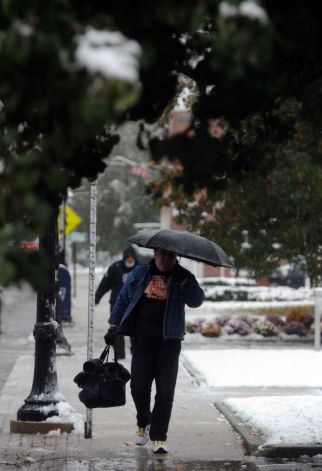 You probably read about the surprise winter storm that shut down much of Connecticut earlier this week. You may not know, however, that I got caught in it.
You probably read about the surprise winter storm that shut down much of Connecticut earlier this week. You may not know, however, that I got caught in it.
After seeing three shows in New York, I took the Sunday-morning train to Hartford to join Mrs. T, who had preceded me to our place in the woods near Storrs. The day after I arrived, the power went out–not just in Storrs but in the greater part of the state. Since we were taking care of our nephew, we couldn’t pull up stakes and return to New York, so we packed our bags and evacuated ourselves to my mother-in-law’s house in Southbury, one of the few places in Connecticut that had electricity, and spent two nights camping out in her guest room.
When it rains, hurricanes have been known to follow. I realized en route to Southbury that I was about to undergo a bout of what I euphemistically refer to as periodic plumbing problems. This happens to me every year or so, and it’s been known to happen at extremely unfavorable moments (i.e., during performances that I’m reviewing). All I could do was drink plenty of water and hope for the best, which occurred shortly before the power went back on in Storrs, to which we returned last night.
I’d been hoping to spend a few quiet days in the woods, emulating Jake Gittes and doing as little as possible. Needless to say, that didn’t happen, and now I’m headed back to New York, where I have three more shows to see, four more pieces to write, and a houseguest to amuse. If you’ve been wondering why I haven’t been posting or tweeting of late, that’s the reason: I wasn’t able to do much more in Southbury than check my e-mail twice a day.
 The good news–yes, there’s a bit of it–is that I read The Complete Fiction of Francis Wyndham during my unscheduled period of inactivity, and relished every page. (Go here to read more about this exceedingly curious character.) I also managed to write tomorrow’s Wall Street Journal drama column, which turned out better than I’d expected.
The good news–yes, there’s a bit of it–is that I read The Complete Fiction of Francis Wyndham during my unscheduled period of inactivity, and relished every page. (Go here to read more about this exceedingly curious character.) I also managed to write tomorrow’s Wall Street Journal drama column, which turned out better than I’d expected.
Otherwise, the week just past was a near-total loss, and I’m damned glad it’s over.
Archives for November 3, 2011
TT: So you want to see a show?
Here’s my list of recommended Broadway, off-Broadway, and out-of-town shows, updated weekly. In all cases, I gave these shows favorable reviews (if sometimes qualifiedly so) in The Wall Street Journal when they opened. For more information, click on the title.
BROADWAY:
• Anything Goes (musical, G/PG-13, mildly adult subject matter that will be unintelligible to children, closes Apr. 29, most performances sold out last week, reviewed here)
• Chinglish (comedy, PG-13, adult subject matter, closes Apr. 29, reviewed here)
• Follies (musical, PG-13, adult subject matter, closes Jan. 22, reviewed here)
• How to Succeed in Business Without Really Trying (musical, G/PG-13, perfectly fine for children whose parents aren’t actively prudish, most performances sold out last week, reviewed here)
OFF BROADWAY:
• The Agony and the Ecstasy of Steve Jobs (monologue, PG-13, closes Dec. 4, reviewed here)
• Avenue Q (musical, R, adult subject matter and one show-stopping scene of puppet-on-puppet sex, reviewed here)
• The Fantasticks (musical, G, suitable for children capable of enjoying a love story, reviewed here)
• Million Dollar Quartet (jukebox musical, G, off-Broadway remounting of Broadway production, original run reviewed here)
IN GLENCOE, ILLINOIS:
• The Real Thing (serious comedy, PG-13, closes Dec. 4, reviewed here)
CLOSING SOON ON BROADWAY:
• Man and Boy (drama, PG-13, closes Nov. 27, reviewed here)
CLOSING NEXT WEEK IN CHICAGO:
• Follies (musical, PG-13, adult subject matter, closes Nov. 13, reviewed here)
CLOSING THIS WEEKEND IN ASHLAND, OREGON:
• August: Osage County (drama, PG-13/R, closes Saturday, reviewed here)
• Julius Caesar (Shakespeare, PG-13, closes Sunday, reviewed here)
• Measure for Measure (Shakespeare, PG-13, closes Sunday, reviewed here)
CLOSING SUNDAY OFF BROADWAY:
• We Live Here (drama, PG-13, reviewed here)
TT: Almanac
“A creative writer must study carefully the works of his rivals, including the Almighty. He must possess the inborn capacity not only of recombining but of re-creating the given world. In order to do this adequately, avoiding duplication of labor, the artist should know the given world. Imagination without knowledge leads no farther than the back yard of primitive art, the child’s scrawl on the fence, and the crank’s message in the market place. Art is never simple.”
Vladimir Nabokov, interview with Alvin Toffler (Playboy, January 1964)
